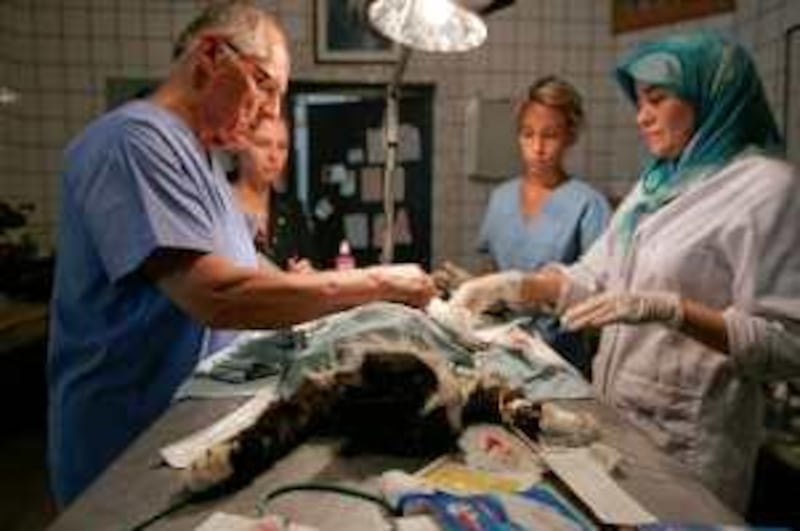FEZ, Morocco // Whenever Mehi's donkey gets a tooth infection, which is often, Mehi takes him to Denys Frappier at the American Fondouk. Every day Mehi and his donkey transport goods through the cramped alleys in the ancient city of Fez. "Donkeys are like taxis here," said Mehi, 65, who did not give his surname. On a slope beneath the city walls stands the American Fondouk, a veterinary hospital that for eight decades has provided free medical care to the thousands of working animals that keep Fez's economy ticking.
The fondouk, which means inn, is modelled on a traditional way-station, with a great wooden gate and stalls for animals surrounding the courtyard. Most are occupied by donkeys and horses convalescing from treatment for worms, respiratory ailments and pack-sores. "All transport in the medina is by beast of burden because the streets are narrow," said Dr Frappier, a Canadian veterinarian who has run the fondouk since 1994. "But often the animals eat garbage and live in dirty stables because they're just seen as working tools."
Each morning the courtyard is filled with braying, whinnying and the clopping of hoofs as Dr Frappier and his staff of nine attend to animals brought for treatment. They offer everything from injections and pills to minor surgery, all free of charge. Occasionally, they also treat pets such as cats and dogs. There is a yellow box in the office with a slot for donations, but most funding comes from the Massachusetts Society for the Prevention of Cruelty to Animals, a Boston-based charity that oversees the hospital.
The fondouk is vital for Moroccans like Abderrahim Sobheil, a worker from the countryside who last week brought in a horse suffering from abdominal pains. "There are other hospitals in Fez, but they charge money," said Mr Sobheil, a stubby man in a straw hat, windbreaker and baggy trousers. "Money that I don't have." Mr Sobheil, who works on a landowner's farm, has four children and five horses, and when an animal falls ill, he brings it to the fondouk. He lives in a village nine kilometres away on the Saiss plateau, undulating farmland that has been a breadbasket for Morocco since Roman times.
The first stones of Fez were laid in the late eighth century by Idris I, a Syrian émigré who claimed descent from the Prophet Mohammed and founded the Idrisid dynasty, which established Morocco as an independent Islamic realm. The city prospered as Morocco's on-and-off capital, attracting luminaries from Tunisia and Muslim Andalusia. Today, Fez is among the largest and best-preserved mediaeval cities in the Arab world, thanks partly to a decision by French colonisers in the 20th century to declare it a historical monument. About one fourth of its 800,000 inhabitants live in the old quarter.
Among the first tourists was Amy Bend Bishop, a US citizen who in 1927 was horrified by the suffering of Fez's 40,000 pack animals. In Boston, she persuaded influential animal rights activists to help set up the American Fondouk. Fifteen years ago Dr Frappier arrived, planning to stay for two years. "And I'm still here," said Dr Frappier, 71, a wry man in glasses and a blue surgical smock. Dr Frappier has known from the age of five that he wanted to spend his life caring for animals.
"Across the street from our house in Montreal was Elmer's Dairy, which delivered milk using carts in the summer and sleighs in the winter," Dr Frappier said. "All I had to do was walk over and ask to clean the horses." Today, Dr Frappier has adopted four cats, 11 dogs - "the door was open; they walked in" - and a donkey named Mushkel, which means problem in Arabic, after initial difficulties in feeding him.
A former veterinarian for Canada's national equestrian team, Dr Frappier's expertise attracts clients from around Morocco. "Cherie is an athlete and needs the best," said Salaf Benkhraba, 20, a stylish woman from Rabat, the capital, whose four chestnut horses stamp and snort proudly in the courtyard. Ms Benkhraba and Cherie will compete this month in Morocco's annual equestrian tournament. "When we leap, I can feel her hesitate," Ms Benkhraba told Dr Frappier. He inspected Cherie's legs and had her canter along the road, then injected a solution to tighten the ligaments supporting Cherie's kneecap.
The fondouk, however, mostly treats working animals like Mr Sobheil's horse. Dr Frappier eased its abdominal cramps with a solution of water and mineral oil "like liquid Vaseline". The people of Fez are learning how to better care for their animals, said Dr Frappier, who has seen visits to the clinic jump from 8,000 to 20,000 a year since his arrival. In the old quarter, Mehi and his donkey stopped to take a break in a cool alley. The thud and ring of hammers echoed from a nearby square where craftsmen were making gold platters and copper pots. Every few minutes a laden donkey and its master plodded by.
"Donkeys can get tired and die on you if you're not careful," said Mehi, stroking the grey hair on his animal's neck. "But mine is healthy now." jthorne@thenational.ae





